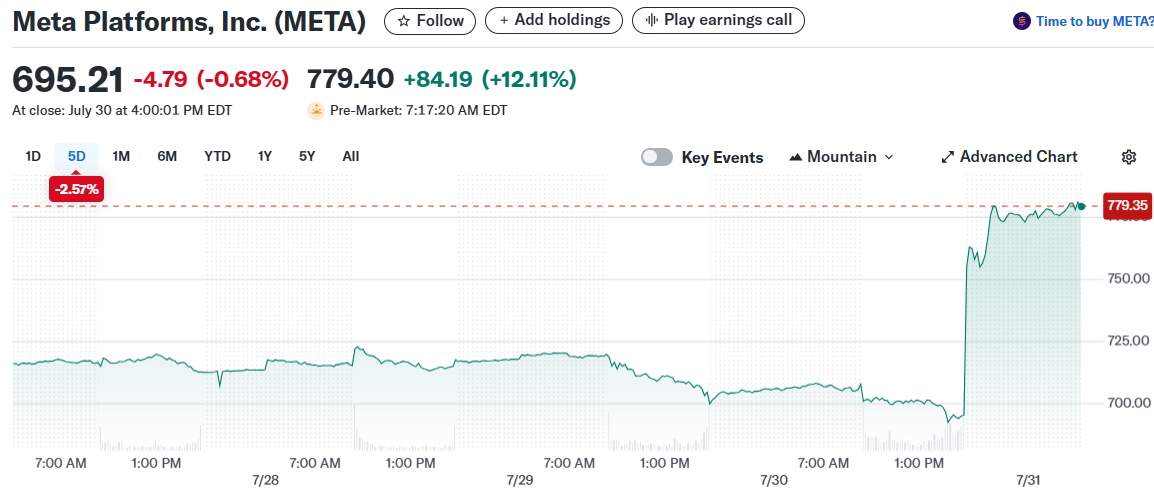TLDR
- Meta stock jumped 12% in premarket trading after Q2 earnings per share hit $7.14 versus expected $5.89
- Revenue reached $47.5 billion, beating Wall Street’s $44.8 billion estimate by a wide margin
- Company provided strong Q3 guidance of $47.5-$50.5 billion revenue, well above $46.2 billion consensus
- Advertising revenue came in at $46.5 billion compared to expected $44.07 billion
- Meta spent $17 billion on AI infrastructure this quarter while generating $26 billion in operational cash flows
Meta’s stock price rocketed higher in premarket trading after the social media giant delivered earnings that left Wall Street scrambling to revise their models. The company’s second quarter performance wasn’t just good – it was the kind of beat that makes analysts wonder if they’ve been setting the bar too low.

The numbers tell a clear story. Earnings per share reached $7.14, crushing the consensus estimate of $5.89. Revenue hit $47.5 billion against expectations of $44.8 billion. These weren’t modest beats – they were the kind of outperformance that sends stocks soaring 12% before the opening bell.
CEO Mark Zuckerberg credited artificial intelligence for much of the success. “The strong performance this quarter is largely thanks to AI unlocking greater efficiency and gains across our ad system,” he said during the earnings call.
The advertising engine that powers Meta’s business showed particular strength. Ad revenue reached $46.5 billion, well above the $44.07 billion analysts expected. Daily users, ad impressions, and price-per-ad all exceeded Wall Street projections.
Meta’s guidance for the third quarter provided another pleasant surprise. The company expects revenue between $47.5 billion and $50.5 billion, with the midpoint of $49 billion sitting well above analyst estimates of $46.2 billion.
AI Investment Strategy Paying Dividends
The results validate Meta’s massive bet on artificial intelligence infrastructure. The company spent $17 billion on capital expenditures this quarter alone, primarily for new AI data centers. That brings total spending in the first half of 2025 to $31 billion.
Zuckerberg has assembled what he calls a “superintelligence team” by poaching top researchers from competitors. Former OpenAI researcher Shengjia Zhao joined as founder and chief scientist of Meta’s Superintelligence Lab. The company also hired former GitHub CEO Nat Friedman and Apple’s head of AI foundation models, Ruoming Pang.
“I spent a lot of time building this team this quarter,” Zuckerberg explained. “The reason that so many people are excited to join is because Meta has all of the ingredients that are required to build leading models and deliver them to billions of people.”
The hiring spree extends beyond individual talent. Meta invested $14.3 billion in Scale AI and brought on CEO Alexandr Wang. The company is building what Zuckerberg calls “personal superintelligence” – a different approach from competitors focused on centralized AI systems.
Spending Plans Accelerate
CFO Susan Li made it clear that the investment pace will only increase. “We expect to ramp our investments substantially in 2026,” she said during the earnings call. The company projects expense growth rates in 2026 will exceed 2025 levels.
Infrastructure costs will drive the largest portion of increased spending. The company is scaling up its data center fleet, with depreciation expenses growing sharply. Employee compensation represents the second-largest growth driver as Meta adds technical talent in priority areas.
The company’s Hyperion data center project exemplifies the scale of investment. This facility will eventually support up to 5 gigawatts of capacity – enough to power millions of homes.
Meta’s Reality Labs division, which houses virtual reality and augmented reality efforts, posted a $4.5 billion loss. This came in better than the expected $4.8 billion loss, though the division continues burning cash as Meta builds its metaverse vision.
The company generated $26 billion in operational cash flows during the quarter, providing ample funding for continued AI investments. This cash generation capability allows Meta to pursue aggressive expansion while maintaining financial flexibility.
Zuckerberg released a statement Wednesday outlining his vision for superintelligence. He emphasized personal empowerment over centralized automation, writing that Meta believes in “building personal superintelligence that empowers everyone.”
The company’s smart glasses initiative represents another revenue avenue. Meta already offers Ray-Ban Meta smart glasses and recently unveiled Oakley Meta glasses. Standalone AI glasses are in development for future release.
Meta’s stock closed at $695.21 on Wednesday before surging to $780 in premarket trading Thursday, representing a 12.2% gain.






